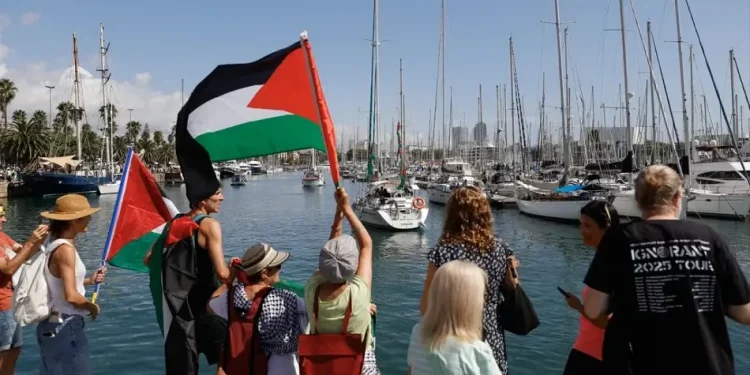The Global Sumud Flotilla, which seeks to overcome Israel’s blockade of Palestine, aims to establish a secure and sustainable maritime corridor to enable the delivery of humanitarian aid to Gaza. As the ILKE Foundation’s “Platform Project: The Agenda of the Muslim World” team, we present excerpts from interviews conducted with scholars to understand this initiative’s on-the-ground dynamics, sources of motivation, and position within the framework of international law.
Professor Berdal Aral shared his insights with Platform:
Where does the Sumud Flotilla’s attempt to reach Gaza stand in the context of international law? What is the legal basis of this initiative in light of the principles of naval blockade, humanitarian aid, and international humanitarian law?
Israel’s military siege and lethal blockade of Gaza, in place since 2007, constitute both a crime against humanity in the form of collective punishment and a significant pillar of the ongoing Gaza genocide since 7 October 2023. Under the 1948 Convention on the Prevention and Punishment of the Crime of Genocide, the States Parties have an obligation to prevent this genocide. However, these obligations have neither halted Israel’s genocidal aggression nor brought an end to the blockade. In its order on provisional measures in January 2024, the International Court of Justice characterized the situation in Gaza in terms of genocide and called for the urgent provision of humanitarian assistance to the territory.
Under international law, the right of navigation on the high seas—which belong to no state—is recognized for all states and their nationals. Non-state actors likewise possess the freedom to navigate the high seas with ships or other seafaring vessels. Absent involvement in unlawful activities such as piracy or drug trafficking, no state’s ships or aircraft may interfere with vessels transiting the high seas. Any such interference would constitute illegal use of force and could even amount to piracy.
Should seafaring vessels owned by non-state actors engaged in efforts to deliver humanitarian aid to Gaza be subjected to Israeli intervention within Gaza’s territorial waters, this would amount to a grave breach of international law on at least two grounds: first, as the United Nations has repeatedly affirmed, Gaza is a territory belonging to the Palestinians, and Israel is an occupying power there; second, genocide and blockade constitute international crimes. These are breaches of erga omnes obligations—violations owed to the global community as a whole.
Where states have manifested incapacity or unwillingness, the intervention of civil society—an integral component of the international community—to deliver necessities to Gaza, thereby breaching this horrific blockade and potentially contributing to its complete removal, is in every respect entirely consistent with international law.
Assoc. Prof. Dr. Ali Osman Karaoğlu shared his insights with Platform:,
What does the statement issued via the Foreign Ministries of 16 countries regarding the security of the Sumud Flotilla guarantee? What are its legal and diplomatic consequences?
The statement by 16 countries, including Türkiye, regarding the Global Sumud Flotilla essentially aims to underscore an existing right of states under international law: the right to protect their nationals through diplomatic protection. In international law, a state’s nationals are considered an extension of that state; harm inflicted on a national is thus treated as harm inflicted upon the state itself.
That said, the exercise of this right is subject to the discretion of the states concerned. If it so chooses, a state may pursue the harm done to its national by invoking the law of state responsibility. Such pursuit may take the form of litigation, sanctions, or other diplomatic measures. Indeed, in the Mavi Marmara incident, proceedings against Israel culminated in a responsibility agreement, and Israel paid compensation. In this sense, every state with nationals aboard the Sumud Flotilla possesses the right to invoke and pursue state responsibility.
It is also possible to provide diplomatic protection preemptively, before harm occurs. Indeed, Spain—one of the 16 states in question—has announced that it will dispatch a warship to protect the Sumud Flotilla. It should be noted that, in the specific circumstances at hand, this is consistent with international law. First, under international law, both civilian and military vessels are entitled to freedom of navigation on the high seas. Second, the Sumud Flotilla is proceeding from the high seas toward the territorial waters of Palestine (Gaza); in this sense, it is not entering Israel’s territorial waters. Israel’s unlawful assertion of that area as part of its maritime jurisdiction does not alter this legal assessment. Third, the naval zone generated by Gaza’s coastline—belonging to Palestine—is under Israeli occupation and blockade. The illegality of this occupation and blockade has been recognized in decisions of both the United Nations Security Council (UNSC) and the International Court of Justice (ICJ). Accordingly, any Israeli intervention under the pretext of the blockade would amount to an armed attack, in which case Spain’s right of self-defense would arise.















































